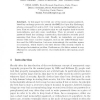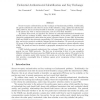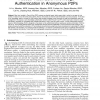123 search results - page 21 / 25 » Modelling the relative strength of security protocols |
CRYPTO
2004
Springer
14 years 23 days ago
2004
Springer
Abstract. In this paper we revisit one of the most popular passwordbased key exchange protocols, namely the OKE (for Open Key Exchange) scheme, proposed by Luck in 1997. Our result...
FC
2010
Springer
13 years 10 months ago
2010
Springer
Abstract. Starting from algebraic properties that enable guessing lowentropy secrets, we formalize guessing rules for symbolic verification. The rules are suited for both off-line ...
CRYPTO
2010
Springer
13 years 8 months ago
2010
Springer
Secure two-party authentication and key exchange are fundamental problems. Traditionally, the parties authenticate each other by means of their identities, using a public-key infr...
TPDS
2008
13 years 7 months ago
2008
Most trust models in Peer-to-Peer (P2P) systems are identity based, which means that in order for one peer to trust another, it needs to know the other peer's identity. Hence,...
FOSSACS
2009
Springer
14 years 2 months ago
2009
Springer
There is growing interest in quantitative theories of information flow in a variety of contexts, such as secure information flow, anonymity protocols, and side-channel analysis. ...



